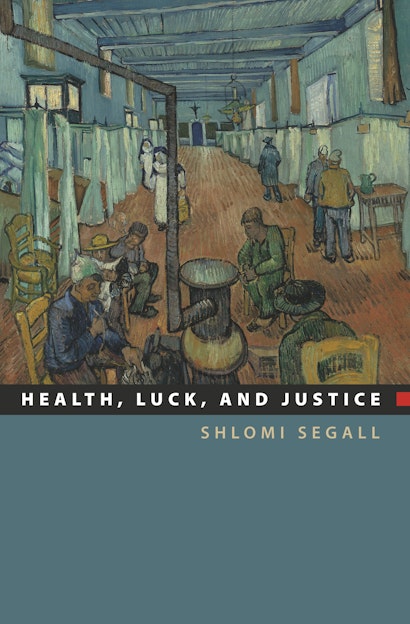“Luck egalitarianism”—the idea that justice requires correcting disadvantages resulting from brute luck—has gained ground in recent years and is now the main rival to John Rawls’s theory of distributive justice. Health, Luck, and Justice is the first attempt to systematically apply luck egalitarianism to the just distribution of health and health care. Challenging Rawlsian approaches to health policy, Shlomi Segall develops an account of just health that is sensitive to considerations of luck and personal responsibility, arguing that people’s health and the health care they receive are just only when society works to neutralize the effects of bad luck.
Combining philosophical analysis with a discussion of real-life public health issues, Health, Luck, and Justice addresses key questions: What is owed to patients who are in some way responsible for their own medical conditions? Could inequalities in health and life expectancy be just even when they are solely determined by the “natural lottery” of genes and other such factors? And is it just to allow political borders to affect the quality of health care and the distribution of health? Is it right, on the one hand, to break up national health care systems in multicultural societies? And, on the other hand, should our obligation to curb disparities in health extend beyond the nation-state?
By focusing on the ways health is affected by the moral arbitrariness of luck, Health, Luck, and Justice provides an important new perspective on the ethics of national and international health policy.
"Segall ably defends why she thinks luck egalitarian theory, with important modifications to prevent the total abandonment of patients, provides a better solution for problems in health care allocation than other theories of justice do. This important, thought-provoking book is distinctive in defending the claim that so-called enhancement technologies should be made available to some as a matter of justice."—Choice
"This is a thought-provoking volume deserving of a wide readership among academics and health professionals and health policy analysts who must struggle with the challenges of trying to create a more just health care system that gives due regard to issues of personal responsibility for one's own health status and costs that might be imposed on social budgets."—Leonard M. Fleck, Notre Dame Philosophical Review
"Although I approached the book with a broadly similar . . . stance to Segall's, I found the arguments took many unexpected turns, though never in a way so as to leave me lost. Any political philosopher or bioethicist will come away from the book knowing much more about both luck egalitarianism and philosophical approaches to health and healthcare."—Carl Knight, Iyyun
"[A]mbitious, rich, and challenging. . . . It is bound to provoke much more extensive discussion."—Daniel M. Hausman, Economics and Philosophy
"Segall's book is an important contribution to the discussion of justice in health care which shows how far theories of justice, especially a luck egalitarian approach can deal with the normative problems we face in this context. But it is also important in showing the limits of theories of justice when we think about the value of health in our overall scheme of good lives and human flourishing."—Michael Quante, Medicine Health Care and Philosophy
"Segall raises the standard for the burgeoning philosophical discussions on health and social justice and gives us much novel material for further consideration. Graduate students and academics interested in political philosophy and health ethics will find this book interesting and a rich resource. It is clearly written, rigorously argued, and thoroughly engaged with relevant literature."—Sridhar Venkatapuram, Sociology of Health & Illness
"Whether the ethical solution is (or can be) implemented on the national or transnational, or state or local levels, remains to be seen, but this book is an interesting first step."—Elizabeth Ann Danto, European Legacy
"His view that luck egalitarians should be concerned only with inequalities is at least plausible. Like many other arguments in this significant contribution to the egalitarian literature, it is certain to spark considerable debate."—Kristi A. Olson, Perspectives on Politics
"As the first serious attempt to apply the luck egalitarian approach to health and justice, this book will be widely read. It is lucid, well argued, rigorous, and analytic."—Ezekiel J. Emanuel, MD, PhD
"In this very welcome book, Shlomi Segall makes a notable contribution to the very small number of serious attempts to provide a basis within a theory of justice for claims on social resources for health. Theoretically sophisticated and morally serious, Segall's book maintains a high scholarly standard. Health, Luck, and Justice should be read by philosophers, bioethicists, economists, and other social scientists concerned with the ethics of health policy."—Daniel Wikler, Harvard University


